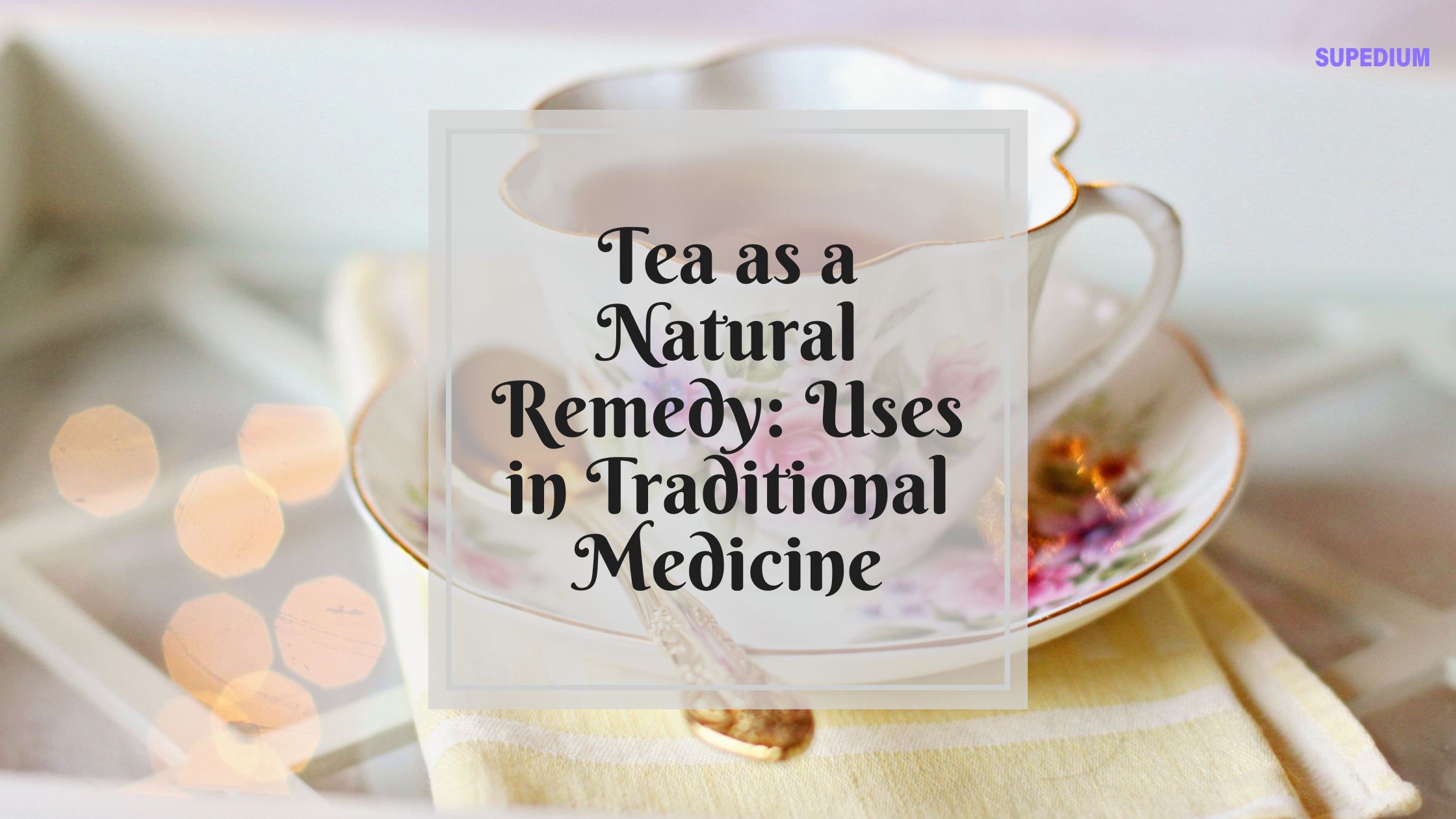Table of Contents
![]()
Tea, consumed worldwide for its taste and cultural significance, has also been revered for its medicinal properties throughout history. This article explores tea’s role as a natural remedy in traditional medicine, examining its uses across various cultures, scientific evidence supporting its benefits, and practical applications.
I. Introduction
Tea as a Natural Remedy
Natural remedies are treatments derived from nature, used for their therapeutic properties. Tea, specifically the Camellia sinensis plant and various herbal blends, has been utilized in traditional medicine for centuries. Its historical use spans multiple cultures, where it has been valued not only for its flavor but also for its potential health benefits.
Purpose of the Article
This article aims to explore the medicinal uses of tea across different cultures, highlight the health benefits associated with various types of tea, and provide practical guidance on incorporating these remedies into daily life.
II. Historical Background
Ancient Use of Tea in Traditional Medicine
Tea’s origins trace back to ancient China, where it was first documented in the Shang Dynasty (16th–11th centuries BCE). Early texts describe tea as a medicinal drink used to promote health, enhance mental clarity, and alleviate various ailments. Chinese scholars and herbalists recognized its benefits and integrated it into traditional Chinese medicine (TCM).
Spread to Other Cultures
Tea’s introduction to Japan, India, and other regions marked its expansion from a Chinese practice to a global one. In Japan, tea became central to Zen practices and ceremonies, while in India, it was incorporated into Ayurvedic medicine. Each culture adapted tea’s use to its own medicinal frameworks and practices.
III. Major Types of Tea and Their Medicinal Uses
Green Tea
- Antioxidant Properties: Green tea is rich in catechins, particularly epigallocatechin gallate (EGCG). These antioxidants help combat oxidative stress, protecting cells from damage and potentially reducing the risk of chronic diseases.
- Cardiovascular Health: Regular consumption of green tea has been linked to lower blood pressure and improved cholesterol levels, contributing to overall heart health.
- Metabolism and Weight Management: Green tea may aid in fat oxidation and enhance metabolic rate, which can support weight management efforts.
- Cognitive Function: Some studies suggest that the caffeine and L-theanine in green tea can improve cognitive function and mental alertness, and potentially delay cognitive decline.
Black Tea
- Heart Health: Black tea is known for its potential benefits in managing blood pressure and reducing cardiovascular risk. Its compounds, such as flavonoids, may improve heart health and circulation.
- Digestive Health: Black tea can aid digestion and alleviate digestive disorders due to its soothing properties and ability to promote gut health.
- Antioxidant Properties: Like green tea, black tea contains antioxidants that help reduce oxidative stress and inflammation in the body.
- Oral Health: The polyphenols in black tea can help reduce oral bacteria, improve dental hygiene, and reduce the risk of gum disease.
Oolong Tea
- Metabolic Health: Oolong tea, with its partial oxidation, helps in weight management and fat metabolism. It may enhance fat oxidation and improve metabolic rate.
- Mental Clarity: Oolong tea can provide a mild caffeine boost and improve mental clarity and cognitive function.
- Bone Health: Some studies indicate that oolong tea may positively affect bone density and strength, potentially reducing the risk of osteoporosis.
- Stress Relief: The calming effects of oolong tea can help reduce stress and anxiety, promoting relaxation.
White Tea
- Skin Health: White tea is known for its high antioxidant content, which helps protect skin from aging, improves elasticity, and maintains a youthful appearance.
- Immune Support: Regular consumption of white tea can strengthen the immune system, providing a defense against common illnesses and infections.
- Cancer Prevention: White tea’s antioxidants may offer protective effects against certain types of cancer by neutralizing free radicals.
- Cardiovascular Benefits: White tea may improve cardiovascular health by supporting healthy blood circulation and reducing cholesterol levels.
Herbal Teas
- Chamomile Tea:
- Sleep Aid: Chamomile tea is renowned for its calming effects, making it a popular remedy for insomnia and sleep disorders.
- Digestive Health: It can relieve digestive issues such as indigestion, bloating, and gas.
- Peppermint Tea:
- Digestive Health: Peppermint tea is effective for relieving symptoms of irritable bowel syndrome (IBS) and nausea.
- Respiratory Health: Its menthol content can help alleviate sinus congestion and respiratory discomfort.
- Ginger Tea:
- Anti-Inflammatory Properties: Ginger tea has strong anti-inflammatory effects, providing relief from arthritis and muscle pain.
- Nausea and Motion Sickness: It is a traditional remedy for nausea and digestive issues, including motion sickness.
- Hibiscus Tea:
- Blood Pressure Regulation: Hibiscus tea has been shown to lower blood pressure, making it beneficial for hypertension management.
- Antioxidant Properties: It provides antioxidant benefits that help combat oxidative stress and inflammation.
IV. Regional Variations in Medicinal Uses
Traditional Chinese Medicine (TCM)
In TCM, tea is used to balance the body’s energy (Qi) and support various health conditions. For example, green tea is valued for its cooling properties and its role in detoxification, while Pu-erh tea is used for its digestive benefits.
Ayurveda
In Ayurvedic medicine, tea is utilized to balance the doshas (body energies). Herbal teas like ginger and tulsi are commonly used to support digestion and boost immunity. Each tea is selected based on its ability to harmonize with the individual’s constitution.
Japanese Traditional Medicine
In Japan, green tea is integral to health practices. It is consumed not only for its flavor but also for its health-promoting properties, including improving digestion and enhancing mental clarity. Japanese herbal teas like bancha are used for their detoxifying benefits.
Western Herbal Medicine
Western herbal medicine incorporates various herbal teas for their therapeutic properties. Herbal blends such as echinacea for immune support and chamomile for sleep are commonly used. These teas are integrated into holistic health practices and modern herbal remedies.
V. Scientific Evidence and Research
Review of Clinical Studies
Numerous studies have examined the health benefits of tea. Research supports the antioxidant, anti-inflammatory, and cardiovascular benefits of green and black teas. Studies on herbal teas have also validated their effectiveness for specific ailments, such as peppermint tea for digestive issues.
Limitations and Considerations
While many studies affirm the health benefits of tea, results can vary based on factors such as preparation methods and individual health conditions. More comprehensive research is needed to fully understand the scope of tea’s medicinal properties.
VI. Practical Applications and Considerations
How to Incorporate Medicinal Teas into Daily Routine
To harness the medicinal benefits of tea, it’s important to select high-quality leaves and follow recommended preparation methods. For example, steeping green tea at the right temperature (160-180°F) for 2-3 minutes preserves its beneficial compounds.
Potential Side Effects and Interactions
While tea is generally safe, excessive consumption can lead to side effects such as insomnia or digestive issues. Certain teas may interact with medications, so it’s crucial to consult healthcare professionals before integrating new remedies into your routine.
Consultation with Healthcare Professionals
Consulting with healthcare providers ensures that tea remedies complement any ongoing treatments and are appropriate for individual health needs. Professional guidance helps avoid potential interactions and optimizes the benefits of herbal teas.
VII. Conclusion
Summary of Key Points
Tea’s role as a natural remedy in traditional medicine is well-documented, with various types offering distinct health benefits. From antioxidant properties to digestive support, tea has been an integral part of holistic health practices across cultures.
Future Directions
As interest in natural remedies grows, continued research will likely reveal more about tea’s therapeutic potential. Future studies may uncover additional benefits and refine our understanding of how tea can be used to support health and wellness.
Share This





Be the first to comment